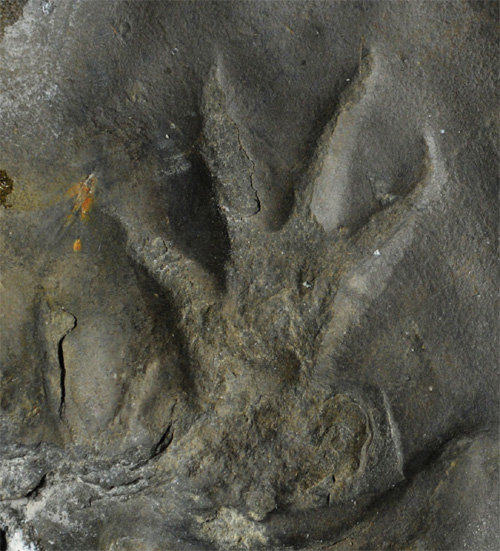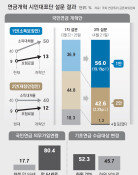Primitive crocodiles lived in Asia as well, says a study
Primitive crocodiles lived in Asia as well, says a study
Posted March. 20, 2020 07:40,
Updated March. 20, 2020 07:40

Unique primitive crocodiles that were found only in Europe lived also in Asia 110 million years ago, reveals a study of fossils discovered in Jinju, South Gyeongsang Province. It is believed that, unlike today, these crocodiles lived mostly on land and walked along the shore with their tails elevated.
Researchers led by Prof. Martin Lockley of the University of Colorado and Prof. Kim Kyung-soo, head of the Korea Geological Heritage Research Institute at Jinju National University of Education, studied the fossil footprint of primitive crocodiles from the Mesozoic Cretaceous, which had been excavated in Jinju Innovation City from 2010 to 2015. The findings suggested that the footprint originated from primitive Crocodylopodus, which has been discovered for the first time in Asia. The study was published on March 4 in Cretaceous Research, an international journal on paleontology.
The fossil footprints discovered by the research team are relatively small, with the rear footprint measuring 7 to 9 centimeters in length. Based on this, the researchers estimated that this primitive reptile is a small crocodile with its body measuring 84 to 108 centimeters in length. In particular, unlike today’s crocodiles that mostly live in water and come out to land only once in a while, the footprint fossil of the animal shows no webbing between the toes, and no sign of a trailing tail. Hence, the crocodile is believed to have mostly lived in shore and walked lightly with its tail lifted. "Considering the shape of the footprints, the crocodile is believed to be very similar to Crocodylopodus," the research team said.
Fossils of various animals, including carnivorous dinosaurs, lizards, the world's first leaping mammals, the world's oldest frog, and the world's smallest raptor dinosaur, have all been discovered in the “Jinju Formation,” the Cretaceous strata in Jinju Innovation City, where the fossils of alligator footprints have just been discovered. "The findings once again confirmed that the Jinju region was a treasure trove of living creatures that were very diverse in the Cretaceous Period,” Prof. Kim said.
ashilla@donga.com







